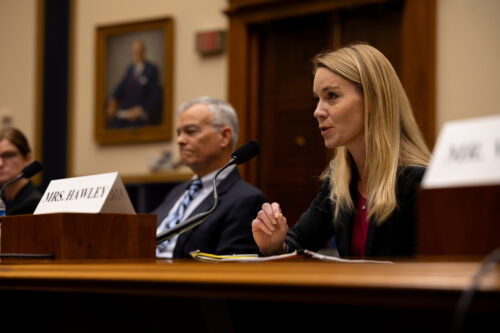
In 2022, Alliance Defending Freedom had the privilege of supporting the Mississippi Attorney General’s Office in defending its pro-life law all the way to the U.S. Supreme Court.
The result of that case, Dobbs v. Jackson Women’s Health Organization, was a resounding win as the high court overturned Roe v. Wade and returned to the people of each state the ability to support women and protect life.
The people of Idaho did just that, and now, ADF and attorneys at the law firm Cooper & Kirk are assisting Idaho Attorney General Raúl Labrador to defend his state’s law against the Biden administration’s unlawful overreach.
What does Idaho’s law say?
In 2020, the state of Idaho enacted the Defense of Life Act. The law protects the lives of both women and their unborn children, ensuring that doctors do not perform abortions unless necessary to save the life of the mother.
After the Supreme Court reversed Roe in 2022, allowing Idaho’s law to go into effect, the Biden administration promptly sued the state, strangely claiming that it could use a longstanding federal law called the Emergency Medical Treatment and Labor Act (EMTALA) to force emergency room doctors to violate state law and end vulnerable lives.
What is EMTALA?
Congress passed EMTALA and President Ronald Reagan signed it into law in 1986 to ensure that emergency rooms provide care to patients in critical need of medical care who are uninsured or otherwise unable to pay. Notably, EMTALA explicitly requires emergency rooms to provide care to pregnant women and their “unborn child[ren].”
Despite the fact that EMTALA protects life, the Biden administration is manipulating it to demand that doctors take vulnerable lives in violation of Idaho law.
The administration’s brazen disregard for the rule of law is astonishing. EMTALA and Idaho’s law both seek to ensure no one—including an unborn child—is denied care.
But facts have not deterred the Biden administration from going after Idaho.
How did Idaho’s case reach the Supreme Court?
In August 2022, a federal district court temporarily blocked Idaho’s law. On appeal, a panel of judges on the 9th Circuit Court of Appeals allowed Idaho to enforce its law, ruling that EMTALA neither conflicts with nor overrides the statute. But a larger en banc panel of the court overturned that decision in an unreasoned, one-sentence order that put Idaho’s law on hold again.
In light of that ruling, Idaho Attorney General Raúl Labrador, together with ADF and Cooper & Kirk, asked the Supreme Court to prevent the Biden administration from continuing to manipulate EMTALA to override Idaho’s law and force emergency room doctors to take vulnerable lives. In January 2024, the Court agreed to hear the case and heard oral argument in April.
What did the Supreme Court say?
In June 2024, the Supreme Court announced its decision. Four justices wrote opinions, but none of them garnered a majority. The court did not rule on the merits of the case, instead sending the case back to the 9th Circuit for further consideration.
Two important facts bear mentioning.
First, in a concurring opinion, Justice Amy Coney Barrett wrote that due to Biden administration concessions at oral argument, “Idaho’s ability to enforce its law remains almost entirely intact.” Put another way, she explained that “the injunction will not stop Idaho from enforcing its law in the vast majority of circumstances.”
Second, as Justice Barrett also noted, “the United States clarified that federal conscience protections, for both hospitals and individual physicians, apply in the EMTALA context.” So even the Biden administration’s incorrect interpretation of EMTALA acknowledges that health-care providers will not be forced to perform abortions against their conscience.
Where does the case go now?
Five of the justices voted to return the case to the 9th Circuit, where the lower court will be asked to reevaluate the case in light of the Biden administration’s concessions at the Supreme Court.
The federal government has no business trying to block Idaho’s law safeguarding women and their children’s lives, and that’s why we’re so grateful to support the Idaho Attorney General’s Office as it defends the people’s law against the Biden administration’s lawlessness.
The importance of the case cannot be overstated: lives are in the balance.
The people of Idaho, through their elected representatives, decided to put the lives of women and their unborn children first. Under Idaho’s law, doctors will continue to care for women experiencing ectopic pregnancies, complications from miscarriage, and other life-threatening conditions.
State of Idaho v. United States of America
- August 2022: The Biden administration sued the state of Idaho seeking to override Idaho’s Defense of Life Act, and a federal district court temporarily enjoined Idaho’s law in emergency rooms.
- May 2023: The district court denied Idaho’s motion for reconsideration.
- October 2023: A panel of the U.S. Court of Appeals for the 9th Circuit unanimously agreed to allow Idaho to enforce its life-saving law.
- November 2023: An en banc 9th Circuit panel reversed the three-judge panel’s decision and prevented Idaho from enforcing its law. Idaho Attorney General Raúl Labrador assembled a team of Supreme Court experts that included his Office of Solicitor General, Alliance Defending Freedom, and Cooper & Kirk to ask the U.S. Supreme Court to prevent the Biden administration from manipulating EMTALA to override Idaho’s law.
- January 2024: The Supreme Court agreed to hear Idaho’s case and said the state could enforce its law and protect the lives of women and children as the litigation continues.
- April 2024: The Supreme Court heard oral argument in the case.
- June 2024: The Court declined to rule on the merits of the case, instead sending the case back to the 9th Circuit for further consideration while leaving Idaho’s ability to enforce its law “almost entirely intact.”





